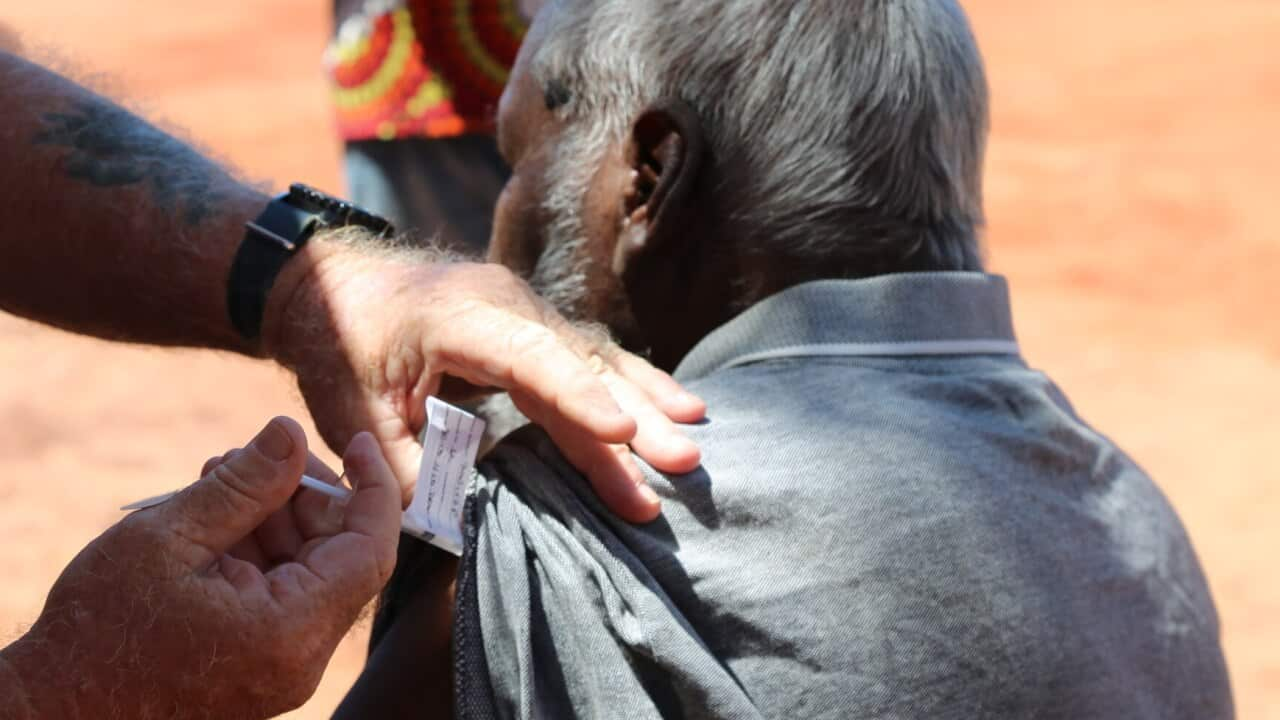Aboriginal and Torres Strait Islander communities are on high alert after the latest outbreak of the coronavirus forced lockdowns in four states and territories.
The spread of the highly contagious Delta variant of COVID-19 has led to a number of lockdowns in New South Wales, Queensland, Western Australia and the Northern Territory.
In the top end, The Northern Land Council will extend the suspension of permits to enter and remain on Aboriginal Land until 1pm on Friday, when the lockdown of the Greater Darwin region is expected to end.
The organisation, which oversees approximately 51,000 First Nations people that live in around 200 communities, initially suspended non-essential visits until today but extended them due to the unfolding situation.
The decision comes after NLC chairman Samuel Bush-Blanasi made repeated calls to his community to remain safe and healthy.
“I congratulate all of our mob who have done a great job looking after families so far and this extension of the suspension of permits is another way we can do our best to make sure people stay safe,” he said in a statement.
The organisation's CEO, Marion Scrymgour, said that the move will not disrupt the delivery of essential services to remote communities.
“We need to do whatever it takes to make sure our mob stays ... Communities right across the NLC area have told us very clearly that we have to stop people traveling unless they are performing an essential service or function," she said.
Ms Scrymgour said they will continue to monitor the NT government’s COVID-19 Public Exposure Sites.

Northern Land Council CEO Marion Scrymgour said the organisation will monitor the unfolding COVID-19 situation in the Territory closely. Source: Northern Land Council
More beds for Larrakia
Meanwhile, Larrakia Nation’s CEO Robert Cooper told NITV News that support is being given to the long grass community, with around 100 spare beds available for anyone stuck in Darwin during the lockdown.
Cooper said that protecting remote Indigenous communities from a COVID19 outbreak has been a “collaborative” process, which has involved effective strategizing to ensure the best measures are in place.
Cooper told NITV News that upon receiving news of the lockdown, Larrakia Nation focused on Providing support for those sleeping rough this lockdown by offering access to information about the rules and how to get vaccinated, and giving them essential supplies such as masks and hand sanitizers.

Larrakia Nation CEO Robert Cooper said they will focus on supporting those sleeping rough. Source: Aneeta Bhole
Vaccination hesitancy
John Paterson from the Aboriginal Medical Services Alliance said there is some hesitancy from First Nations peoples in the Northern Territory which could be a factor in low vaccination numbers in the communities.
“I think that low percentage reflects the hesitancy. There was no doubt there was some hesitancy particularly around the AstraZeneca vaccine and people obviously wanted to wait and see," he told NITV News.
“This is a really serious virus that is easily spread amongst community. We need to be protected. Our message is that the vaccines are safe and will reduce sickness and hospitalisations and death.
“We are very, very nervous and very concerned about this breakout."
NITV News reached out to several other First Nations communities across the nation for an update on their response.
South Australia's Anangu Pitjantjatjara Yankunytjatjara Lands (APY) remains open to residents from the state but is monitoring visitation requests. They will not be issuing permits from states with border closures.
The Bush Bus and Bush Bee services, which charter to Aboriginal communities, have also suspended operations due to the border closure with the Northern Territory.
In Far North Queensland, The Palm Island Aboriginal corporation said they were currently undertaking briefings on how to deal with the unfolding situation and would be keeping the community informed of safety measures as they were being implemented.

AMSANT CEO John Paterson said the latest COVID-19 outbreak is hugely concerning. Source: SBS News
Federal government defends progress
The Federal Minister for Indigenous Australians Ken Wyatt said it's disappointing that more First Nations people aren't vaccinated.
Federal Health Department data from last Friday showed that approximately 90,000 Aboriginal and Torres Strait Islander people were only partially vaccinated with just one jab.
"it's social media, it’s the messages of the antivaxxers, it’s the messages of media itself who have covered individuals who have had blood clots that has scared people.”
“It is disappointing, I think there is a reticence amongst our people, they are fearful,” Mr Wyatt told NITV News.
“There are some people that believe it’s only gonna be in capital cities but all you need is for one person to travel and have that COVID-19 and as they go through can infect other people.”
The federal government has defended its vaccination progress to date and rejected criticisms that changing medical and government advice has led to hesitancy.
“No it's not — In fact it's social media, it’s the messages of the antivaxxers, it’s the messages of media itself who have covered individuals who have had blood clots that has scared people,” the Minister said.


